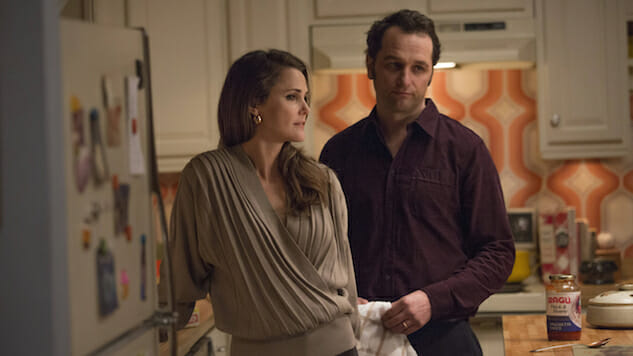Familial Miracles: On The Americans‘ Graceful Approach to the Parent-Child Bond
Patrick Harbron/FX
There is a remarkable moment in journalist and activist Masha Gessen’s 2012 biography of Vladimir Putin, The Man Without a Face: The Unlikely Rise of Vladimir Putin.
It appears right after she details the horrors that Putin’s parents survived during World War II, before his birth: disfiguring war wounds for Putin’s father; a first son who died in a group home; the staggering, communal, multi-year trauma of famine and shelling that was the siege of Leningrad; and, after the war, life in the city’s stark, looming apartment buildings, places stripped of all furnishings save for small, cast-iron wood-burning stoves.
Out of all this, Gessen calls Putin’s family a “miracle.”
Though dulled in our American context by sportscasters and Prosperity Gospel shills, “miracle” is a word without synonym. So, as desolate as Putin’s family situation may have been to us, the graces add up in context. An intact marriage, a home and a new baby—the Putins were, in the context of post-war Soviet life, a “miracle.”
I’ve been returning to the idea of familial miracles—the ones that happen, the ones that are withheld—as I watch this season of The Americans. We’re halfway through a season that feels ever more focused on the serrated edges between parenting and handling, and the inevitable slide in the Jennings’ world from the former into the latter.
Since the end of Season Two, the way that Philip (Matthew Rhys) and Elizabeth (Keri Russell) have taught, treated and loved their daughter, Paige (Holly Taylor), has occupied the show’s center. The KGB wants Paige to become the crown jewel of a new wave of agents. Paige wants to be a teenager. Her parents want her to be some impossible admixture of both. After her earnest religious awakening in the second season, she saw Philip literally rip a Bible to shreds on their kitchen counter. A few episodes later, she gets them to try church. After she sees Elizabeth effortlessly ward off a random assailant on the street in Season Four, stabbing one mugger to death in front of her, Paige becomes her mother’s student in self-defense. Then, in last week’s episode, “The Committee on Human Rights,” she uses her Judo 101 to push away naïve, confused Matthew Beeman (Danny Flaherty) as she dumps him.
The series’ commitment to the give-and-take, teach-and-listen rhythms of parenting has transformed its domestic life into something more compelling than its spycraft. It has also made the stakes of the Jennings’ familial great game feel simultaneously approachable and unique. Well-meaning parents who misread teenage grief, as the Jennings do after Paige’s breakup, are as common as table salt. By contrast, it’s rarer to have our parents steer our dreams for a more just world into espionage.
Other TV shows have displayed the end results of parenting, but few have shown the actions that undergird the role. Tony Soprano’s simple desire for Meadow to become a doctor—a dream more about Tony’s own inner life than Meadow’s—became a refrain fit for a rosary. But seldom does Tony actually do anything with his daughter beyond praise and taunt. Don Draper fills his daughter, Sally, and her home life with evasions, promises and pitches. And when we see Sally at peak teen at boarding school, she’s all bluffs and tales and social leverage. Justified and Scandal present parents as present-tense adversaries, “what if?” fun-house mirrors of the protagonist (which, in some way, is a kind of truth about parents and children).
The Americans instead uses a range of narrative tools to supply memorable whys and delicate hows for the Jennings’ parental style. Thoughtful, sparingly used flashbacks to Elizabeth’s and Philip’s childhoods make clear the roots of Philip’s doubt and sadness and Elizabeth’s dutiful fury. We see Philip’s silent response to Paige’s fear that now, exposed to the family business and history, she’s “meant to be alone.” A dark, indestructible heirloom passes from father to daughter. We’ve seen Elizabeth forced to sacrifice surrogate children for the KGB for years: Lucia in Season Two, and, her swift, maternal mercy kill of Lassa-infected Hans in this season’s premiere. So, when she takes Paige under her wing as an explicit protégé, we feel an earned intensity beneath her self-defense training and you-will-do-this directives.
Yet The Americans, again and again, refuses the easy tag that Elizabeth and Philip allow their parenting to slip completely into handling. Season Three’s clandestine reunion in Berlin, where Elizabeth shares one last hour with her dying mother and Paige meets her grandmother for the first and last time, had one of the show’s most emotionally resonant images. A silent tableau of three generations of women, linking hands in silent prayer, each occupying her own spot along different lines of identity and life cycle: atheist/believer, Russian/American, dying/ascendant, daughter/mother.
This season has tightened the vice grip that “handling” has over parenting, and allowed for moments of humane, parent-child grace (surrogate and familial both) to surge into the show like steam from under a volcano. Nowhere do we see this more than in the muddled, ghostly chains of paternity among Philip, his long-lost son, Mischa (Alex Ozerov), and the Jenningss’ handler, Gabriel (Frank Langella), a surrogate father to Philip and Elizabeth.
-

-

-

-

-

-

-

-

-

-

-

-

-

-

-

-

-

-

-

-

-

-

-

-

-

-

-

-

-

-

-

-

-

-

-

-

-

-

-

-








































